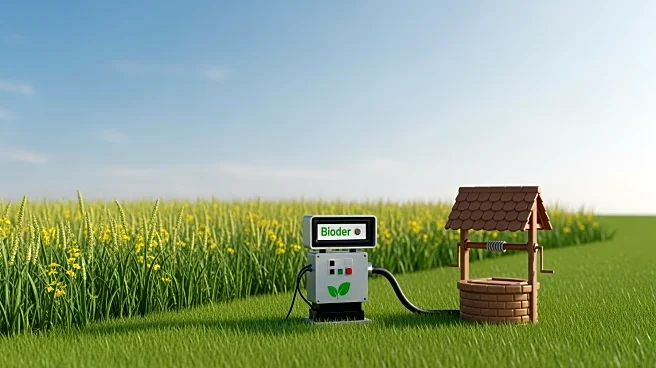What's Happening?
Ahead of the COP30 climate change negotiations in Belém, Brazil, nearly 100 scientists, including members from the Union of Concerned Scientists, have signed a letter urging global leaders to limit the expansion
of biofuels. Brazil is advocating for a pledge to quadruple 'sustainable fuel' use, including doubling biofuels consumption, as part of the international response to the climate crisis. However, scientific evidence suggests that biofuels currently result in 16% more emissions than the fossil fuels they replace. By 2030, biofuels are projected to emit 70 MtCO₂e more annually than fossil fuels, equivalent to adding 30 million diesel cars to the roads. The letter warns of severe environmental impacts, including biodiversity loss, water resource depletion, and agricultural runoff. Additionally, increased biofuels use could exacerbate global hunger by raising food prices and diverting calories from human consumption.
Why It's Important?
The call to limit biofuels is significant as it challenges the perception of biofuels as a climate-friendly solution. The expansion of biofuels could lead to increased emissions, undermining efforts to combat climate change. Furthermore, the environmental and social consequences, such as biodiversity loss and food insecurity, highlight the need for sustainable alternatives. Countries like Brazil and Indonesia, major biofuel producers, face pressure to manage these impacts through better governance and energy policies. The situation underscores the importance of balancing energy needs with ecological and social responsibilities, influencing future climate policies and international agreements.
What's Next?
As COP30 approaches, global leaders will need to address the concerns raised by scientists regarding biofuels. Potential actions include setting caps on biofuel cultivation, improving traceability, and investing in community-based governance. The international community may consider alternative energy solutions that are truly sustainable and do not compromise food security or environmental health. The discussions at COP30 could lead to new commitments or adjustments in biofuel policies, impacting future climate strategies and international cooperation.
Beyond the Headlines
The debate over biofuels highlights broader ethical and policy challenges in addressing climate change. The reliance on biofuels reflects a resurgence of interest in commodities that have historically led to deforestation and human rights abuses. This situation calls for a reevaluation of energy policies that prioritize ecological integrity and social justice. The push for biofuels also raises questions about the role of scientific evidence in shaping public policy and the need for transparent decision-making processes.









